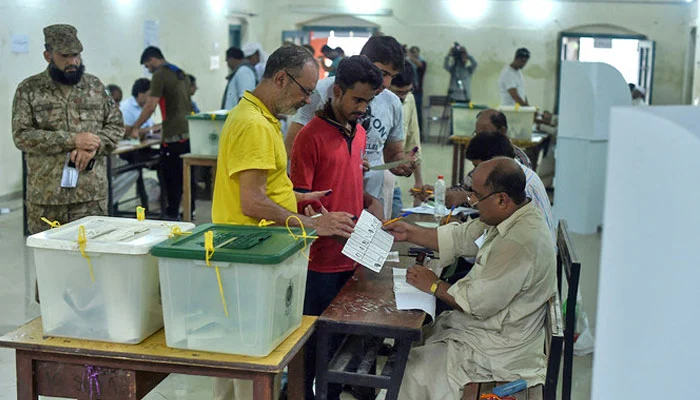ISLAMABAD The Pakistani Election Commission has designated over 51% of polling places as “sensitive” for the upcoming general elections on February 8, according to a Monday story in The News.
The electoral commission reports that, of the 90,675 polling places, 46,065 have been classified as sensitive and 18,437 as highly sensitive.
According to ECP sources who spoke with The News, Punjab now has 18,620 sensitive and most sensitive polling places, of which 12,580 are sensitive and 6,040 are most sensitive. In contrast, 32,324 of the 50,944 polling places in the largest province have been designated as normal.
In contrast to Punjab, Sindh has 5,937 conventional polling stations out of a total of 19,006 polling places.
The province has 6,545 sensitive polling locations and 6,524 most sensitive polling stations out of these.
Similarly, there are 10,309 sensitive and most sensitive polling places in Khyber Pakhtunkhwa, comprising 6,166 sensitive and 4,143 extremely sensitive polling places. There are 15,697 polling places in the province altogether, of which 5,388 are regular polling places.
It seems logical that there are significant security and sensitive concerns about the situation in Balochistan. In this province, which is the largest in terms of territory but the lowest in terms of population, there are 5,028 voting places overall. Of these, only 961 have been designated as normal, while the rest, 4,067, are classified as sensitive or extremely sensitive. Among them are 1,730 most sensitive and 2,337 sensitive polling locations.
The final polling plan for the general elections on February 8 was released by the ECP on Friday. It calls for the installation of 2,76,402 polling booths and 90,675 polling stations nationwide to serve more than 128 million voters.
A senior official acknowledged that more than 150,000 fewer polling places are being set up than the legislation requires, which will make it nearly impossible for everyone in attendance to cast a ballot at different locations if turnout is strong.
50,944 polling places will be set up in Punjab for the general elections, followed by 19,006 in Sindh, 15,697 in Khyber Pakhtunkhwa, and 5,028 in Balochistan, according to the plan.
The final list of polling places for each constituency must be published in the official Gazette and on the ECP website at least 30 days before election day, as mandated by Section 59(6) of the Elections Act, 2017. However, the panel failed to meet the 15-day legal limit that it had set for itself.
The election plan distributes polling places across the four provinces and the federal capital, classifying them as normal, sensitive, or highly sensitive according to the level of security and the past incidence of electoral violence.
In contrast to the 2018 general elections, the Army forces assigned to poll-related security responsibilities would remain outside the polling places during the electoral exercise, the ECP announced in a statement on Thursday.







